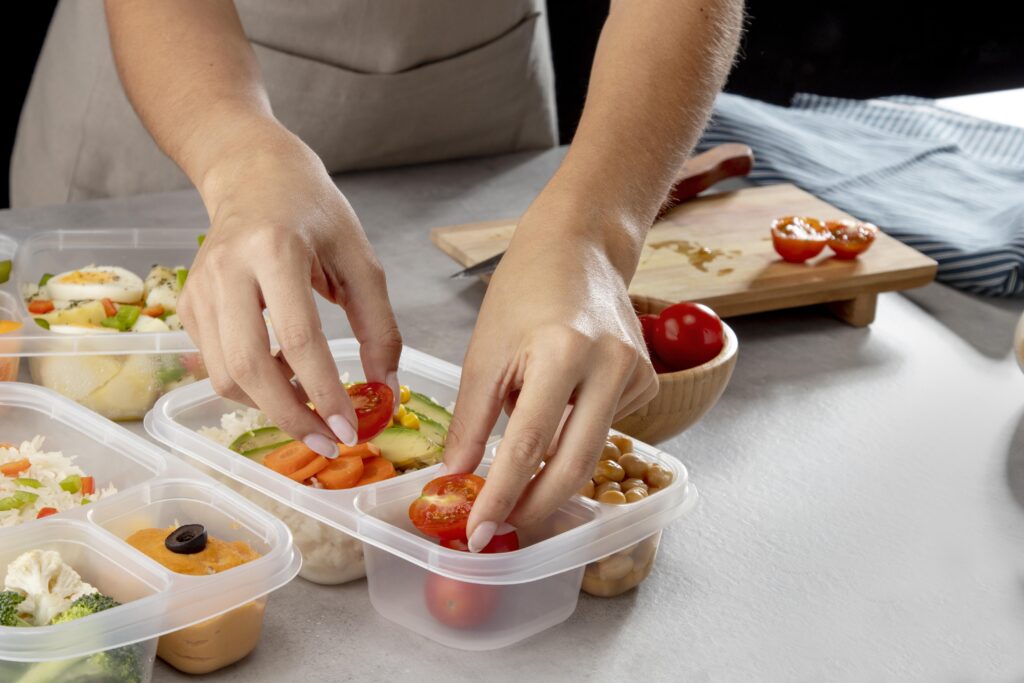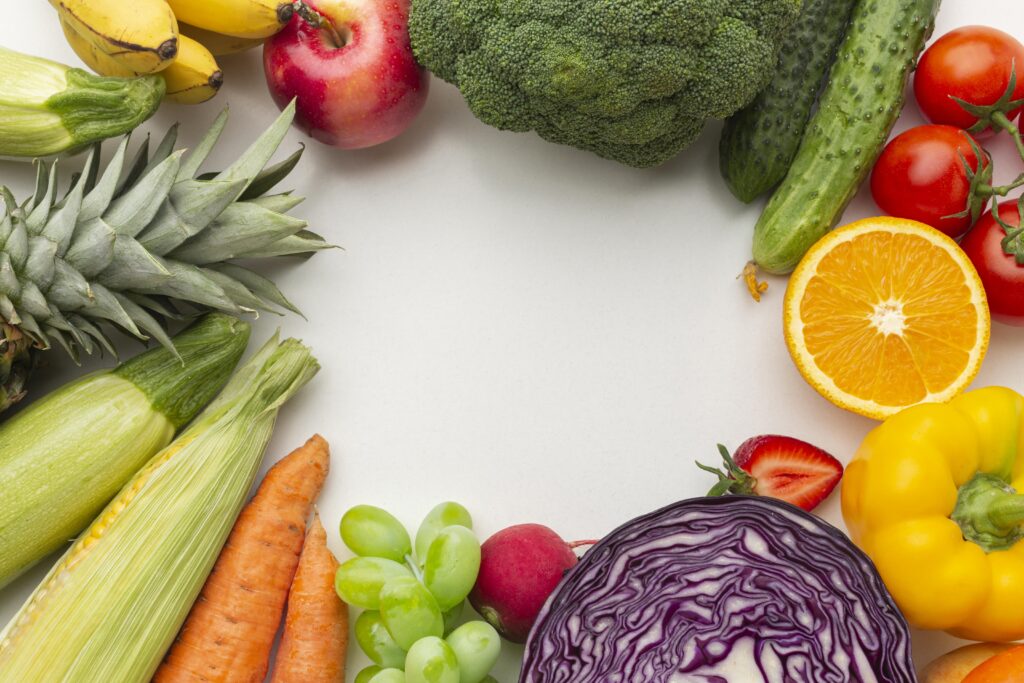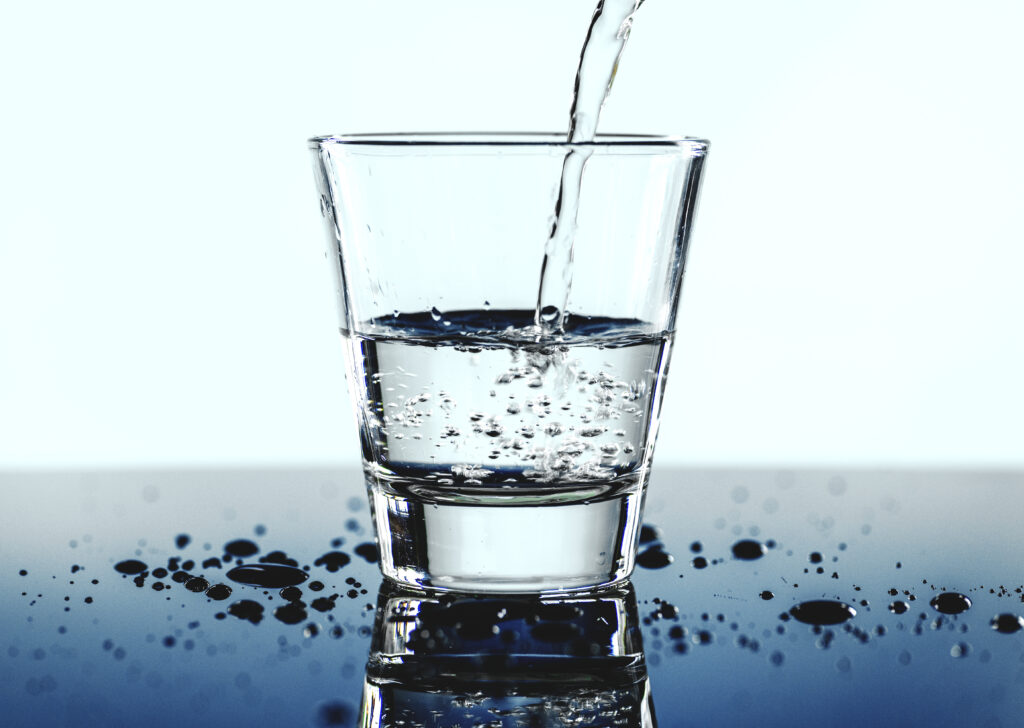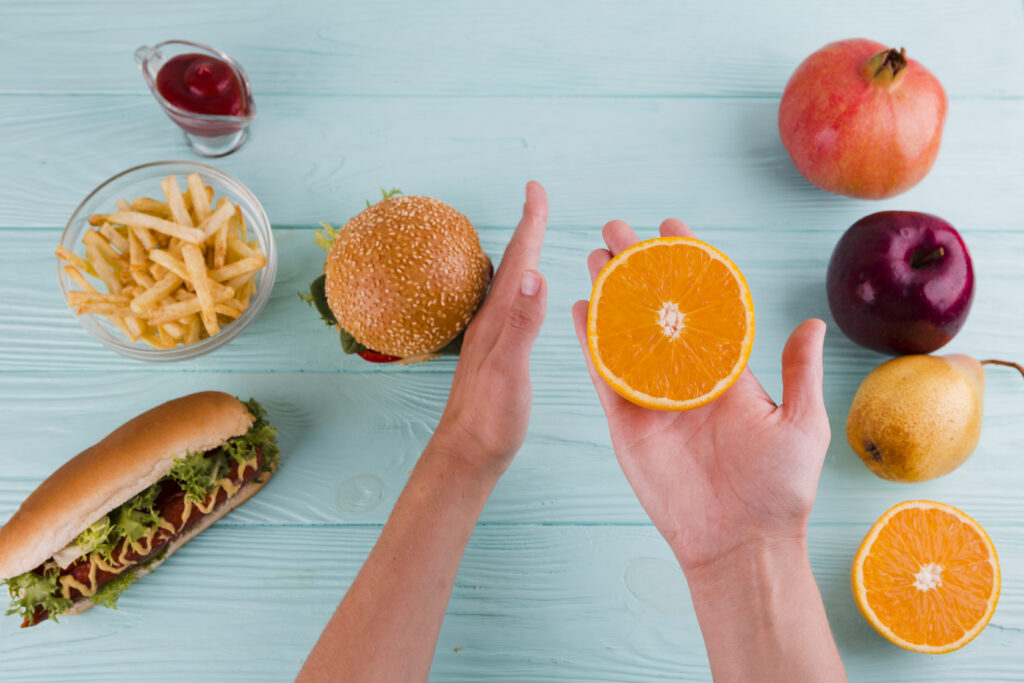Some people want to lose weight but lack the time, energy, or physical ability to exercise regularly. Many people prefer options that do not require exercise, whether it is due to a busy schedule, an injury, or simply personal preference. While exercise is beneficial to overall health, the good news is that weight loss can still be achieved through a healthy lifestyle and diet. In this guide, we’ll go over 8 simple yet effective tips for reaching your weight loss goals—no gym required!
Table of Contents
Toggle1. Focus on Portion Control

Portion sizes have a huge impact on how many calories we consume each day. When we eat large portions, even of healthy foods, we frequently consume more than our bodies require. Using smaller plates and pre-portioning snacks can help prevent mindless overeating.
Another useful approach is the “80% full” rule, which states that you should stop eating when you are 80% satisfied rather than stuffed. This practice prevents overeating and allows your body to signal when it is truly full. These simple steps can make a significant difference without the use of calorie counting!
2. Prioritize Protein Intake

Protein helps you feel full and maintains a steady metabolism, making it easier to avoid overeating. When you include protein in each meal, you can reduce cravings and the desire to snack on less nutritious foods later.
Here are some high-protein meal ideas for everyone:
- For meat eaters, chicken, turkey, lean beef, and eggs are excellent choices.
- For dairy lovers, try Greek yogurt, cottage cheese, or cheese.
- Plant-based protein options include beans, lentils, chickpeas, tofu, quinoa, and nuts.
By including a small amount of protein in each meal, you will likely feel more satisfied and balanced throughout the day.
3. Embrace the Power of Fiber

Fiber is a secret weapon for weight loss because it keeps you full and promotes smooth digestion. When you eat enough fiber, you’ll naturally feel more satisfied for longer, which helps you avoid overeating.
Fiber-rich foods include fruits (apples, berries), vegetables (broccoli, carrots), and whole grains (oats, brown rice). If getting enough fiber from food is difficult, a gentle fiber supplement can help fill the gap. Just make sure to drink plenty of water to keep things running smoothly!
4. Stay Hydrated Throughout the Day

Drinking enough water can help you lose weight. When you’re properly hydrated, you’re less likely to mistake thirst for hunger, resulting in fewer unnecessary snacks and calories. Plus, drinking water before meals can help you feel fuller faster, so you’re more likely to eat smaller portions.
Here are some simple ways to improve your water intake:
- For a tasty twist, try adding fresh fruits such as lemon, lime, or berries.
- Set Reminders: Use your phone to send yourself gentle reminders to drink water every few hours.
- Carry a Water Bottle: Having a bottle with you makes it easy to sip throughout the day.
A steady intake of water not only aids in weight loss, but it also keeps you energized and focused all day!
5. Limit Processed Foods and Sugary Snacks

Processed foods are frequently high in unhealthy fats, sugars, and empty calories, making it easy to overeat. This can cause weight gain and increased cravings. Instead of reaching for chips or candy, consider healthier options. For example, if you’re craving something sweet, grab some fresh fruit or eat nuts instead of chips. Cutting back on sugar not only improves weight management, but it also keeps your energy levels consistent throughout the day.
6. Incorporate Mindful Eating Habits for Weight Loss

Mindful eating involves paying attention to your food, savoring each bite, and enjoying the flavors. To practice this, try eating slowly, chewing thoroughly, and avoiding distractions like your phone or TV. Before your meal, take a moment to breathe deeply or do a quick meditation to clear your mind. This can help you connect with your hunger cues and prevent overeating.
7. Get Enough Quality Sleep

Sleep plays an important role in weight management. When you don’t get enough sleep, it can disrupt hormones that regulate hunger, resulting in cravings and overeating. To improve your sleep, try developing a bedtime routine that relaxes you, such as reading or taking a warm bath. Also, limit your screen time before bedtime to help your mind relax. Getting enough quality sleep can help you reduce cravings and make better food decisions.
8. Plan Meals and Snacks Ahead of Time

Meal planning is an effective way to lose weight without exercising. When you plan your meals and snacks ahead of time, you are less likely to choose unhealthy options when hunger strikes. Consider preparing simple meals such as grilled chicken and vegetables or a hearty salad. Keeping healthy snacks on hand, such as cut-up fruits and vegetable sticks, can help you avoid the temptation to eat junk. Planning ahead of time eliminates the guesswork of eating well and keeps you on track to meet your goals.
Conclusion
In this guide, we’ve looked at eight simple but effective tips for weight loss without exercise. Remember that small changes can produce big results over time! You can improve your weight by focusing on portion control, increasing protein and fiber intake, staying hydrated, limiting processed foods, practicing mindful eating, getting enough sleep, and meal planning.
Try implementing a few of these tips at a time to see which ones work best for you. Every small step counts! We’d love to hear about your journey; please share your experiences and any additional tips in the comments section below. We can help each other on this journey to healthier living!
FAQS
Yes! While exercise is good for your health, you can lose weight by changing your diet and lifestyle. Focusing on nutrition, portion control, and mindful eating can yield significant results.
Each person’s results vary depending on their starting weight, metabolism, and adherence to the tips. With consistent small changes, you may notice changes in your weight and energy levels within a few weeks.
You can boost your protein intake by including eggs, Greek yogurt, lean meats, beans, legumes, and nuts in your meals and snacks. Protein shakes and bars are also convenient options.
To practice mindful eating, aim to eat slowly and without distraction. Even if you’re busy, take a few moments to enjoy the flavors and textures of your food. Planning your meals ahead of time allows you to focus on your food rather than eating on the go.
Limit your intake of processed foods, sugary snacks, and high-calorie beverages, as these can contribute to weight gain and cravings. Instead, consume whole, nutrient-dense foods such as fruits, vegetables, whole grains, and lean proteins.